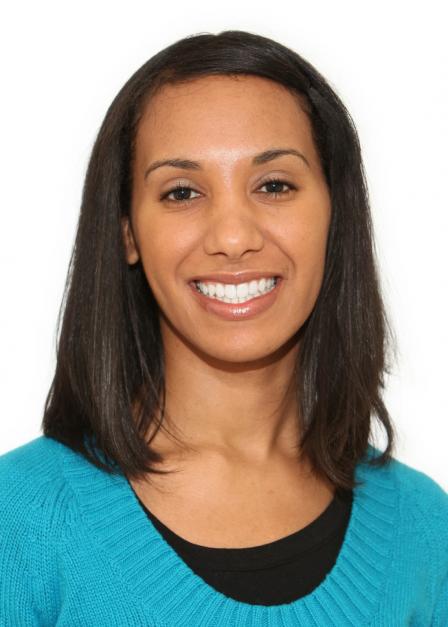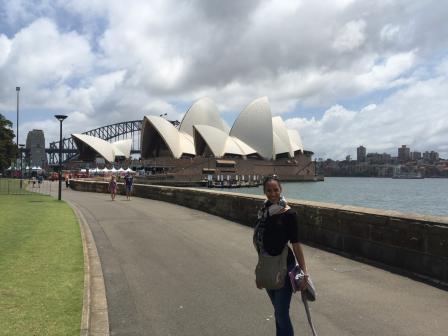Meet EPA Researcher Rachelle Duvall, Ph.D.
EPA Research Physical Scientist Dr. Rachelle Duvall works with equipment that measures air pollution—evaluating, testing, and approving of methods that are used in air quality monitoring networks across the U.S. EPA Research Physical Scientist Dr. Rachelle Duvall
EPA Research Physical Scientist Dr. Rachelle Duvall
Tell us about your background.
I grew up in Albany, New York. I got Bachelor of Science degree in Chemical Engineering at the University of Rochester. I then went to graduate school and got a Master of Science and Doctorate in Civil and Environmental Engineering (focusing on air pollution control) at the University of Wisconsin – Madison. I came to North Carolina for a postdoctoral position at EPA in 2005, and I’ve been here ever since.
How does your science matter?
I evaluate equipment that measures air pollution, specifically criteria pollutants. Criteria pollutants are a group of six pollutants that are ubiquitous in the air and cause adverse impacts on human health and the environment. Criteria pollutants include ozone, nitrogen dioxide, sulfur dioxide, particulate matter, lead, and carbon monoxide. These pollutants are regulated as part of the National Ambient Air Quality Standards (NAAQS). My research involves testing, evaluating, and approving equipment used to monitor criteria pollutants. These measurement methods are important because they provide the foundation for protecting human health and the environment. Air monitoring networks are located all across the U.S. and these networks use the monitoring equipment that I evaluate.
What do you like most about the research that you do?
I like that there’s a variety of new things that I can explore. Science is always changing and advancing and it is exciting to be part of that. For example, I have been conducting research on sensor technologies which are small hand-held devices that measure a variety of air pollutants. Compared to traditional air monitoring devices, small sensor devices are much cheaper in cost, easy to use, and can be carried around to measure pollution. My sensor research has also allowed me to combine my interests in educational outreach and citizen science. Sensor devices are an excellent tool for teaching and raising community engagement and awareness about air pollution.
If you could have dinner with any scientist, past or present, whom would you choose and what would you ask him/her?
I would have dinner with Stephen Hawking. I find his life story very fascinating and I’m impressed by the huge scientific impact and contributions he’s made. I would ask him about his research, books and what keeps him determined and motivated despite challenges.
If you weren’t a scientist right now, what would you be doing?
I really like managing finances at home and also organizing vacations so I’d probably do something related to that. I would go back to school and get either a business or finance degree and become a financial planner, accountant or a travel agent. I would also like to open up a shopping center with all of my favorite stores and restaurants such as Trader Joe’s, Potbelly Sandwich Shop, and Jamba Juice.
When did you first know that you wanted to be a scientist?
I knew I wanted to be a scientist in high school. I always liked math. I specifically liked chemistry but I didn’t really like any of the other sciences. I didn’t know what I could do with those subjects. Every Saturday morning, my older sister and I used to go to a science and technology enrichment program at a local college in New York where we would do science or math experiments in a laboratory. One day, I attended a career panel of engineers and scientists, and I heard a female engineer talking about her career as a “chemical engineer” and thought, “That’s what I want to do!” Chemical engineering seemed like a good fit for me since I loved math and chemistry.
What advice would you give students interested in a career in science?
Taking a variety of science and math classes is very important and having hands-on scientific experience through internships or volunteer activities. My biggest piece of advice is to maintain your communication skills! Communication is very important as a scientist. Many students are attracted to science careers because they don’t like to write. However, to advance as a scientist you have to tell people about your research, whether it’s through writing a paper or giving a presentation. Make sure you take classes that encourage you to write (English, History, or others) and practice your public speaking skills.
 Dr. Rachelle Duvall recently completed a three-month detail as a Science Fellow at the U.S. Embassy in Canberra, Australia.What do you think is our biggest scientific challenge in the next 20/50/100 years?
Dr. Rachelle Duvall recently completed a three-month detail as a Science Fellow at the U.S. Embassy in Canberra, Australia.What do you think is our biggest scientific challenge in the next 20/50/100 years?
I think addressing climate change globally will be a big scientific challenge that will span many years. While there’s a general scientific consensus that climate change is occurring, there’s still a fair amount of skeptics. I recently completed a three-month detail as a Science Fellow at the U.S. Embassy in Canberra, Australia where I was helping advance climate change outreach. Working in Australia reminded me that every country has different approaches to reduce greenhouse gases and every country is experiencing adverse impacts of climate change. During my short time in “Oz”, I observed a number of climate change impacts such as the unseasonably warm temperatures at the start of spring, early bush fire (wild fire) warnings, drought conditions, the destruction of coral at the Great Barrier Reef, and much more. Globally, there is still a significant dependence on non-renewable energy sources like fossil fuels. How can we continue to move towards using more renewable energy sources while also balancing economic, social and/or cultural needs? It’s certainly challenging.
If you could have any superpower, what would you choose?
Having recently watched the X-Men series, I would like the power to absorb everyone else’s superpowers so I could have a variety of options.
What type of food truck would you operate?
I really love popcorn – I consider it a major food group! My food truck would have a variety of different flavors of popcorn from sweet to salty or a mix, made to order.
